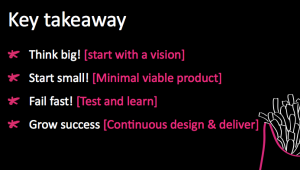Act like a startup
I recently presented at the AOP Forum on secrets of product success. Twenty minutes to get through sixty two slides was fun; part of me tells me I need to slow down, be more considered and reduce the messages I want to get across. Another part of me just says meh!
I ended the presentation with the below takeaway slide that is worth replaying here. I believe that product owners need to start thinking more like entrepreneurs and their seedling product ideas more like start ups.
Think big: Start with a big picture, a vision, where you want to get to. This should be unconstrained thinking, divergent thinking before converging on the specifics.
Start small: Easier said than done, but this is the getting to a minimum viable product.
Fail fast: Get stuff to market quickly, test with your consumers and be ready to fail. If you fail early you fail cheaply. Realise that you have customers, users who are already passionate advocates of your brand. Take them on the journey of development with you. You not assume that everything you need to take to your customers must be polished and perfect. Don’t underestimate the positivity than can be accrued by engaging users in the development process
Grow success: Do not see the end of the project as the end of road. Getting to a first release is only the first step. Successful product owners will be engaged in a virtuous cycle of continuous design and continuous delivery. They can come up with an idea, a new feature and get it in to production in hours, or days rather than months.
